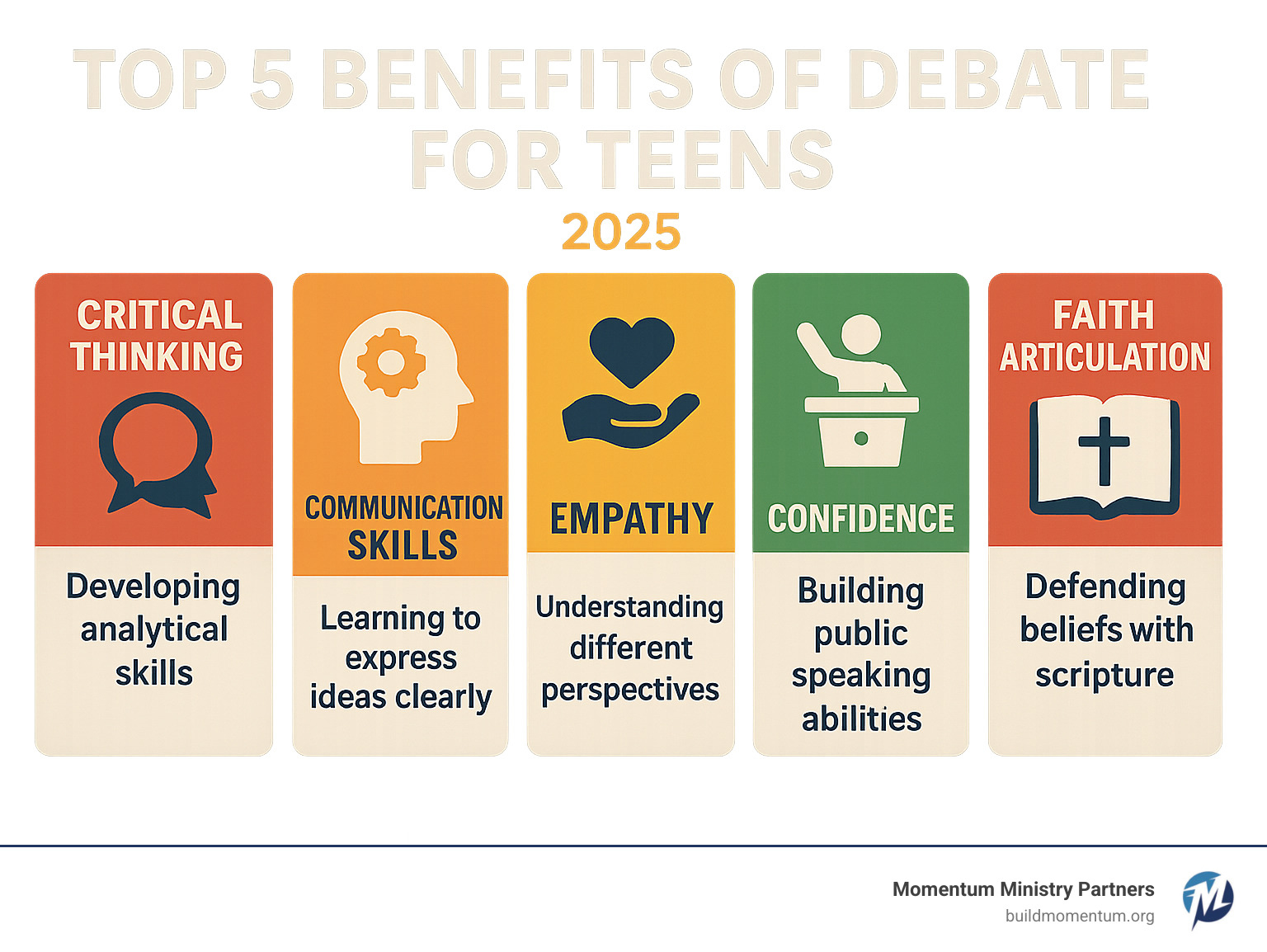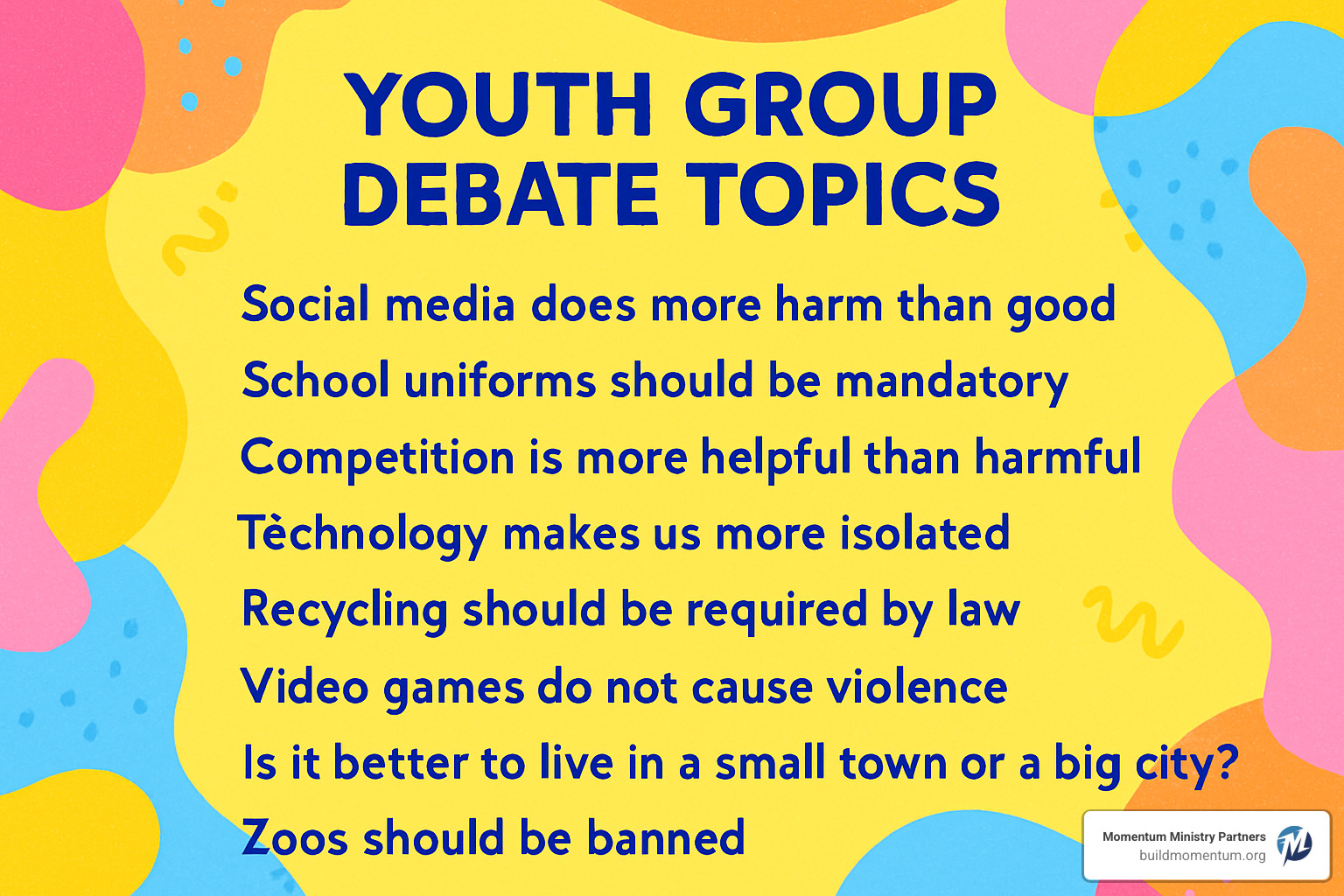Why Youth Group Debate Topics Are Essential for Teen Engagement
Youth group debate topics are powerful tools that transform passive listeners into active participants who wrestle with their faith and worldview. Here are some of the most effective categories to get your teens talking:
Faith-Based Topics:
- Is faith in Jesus the only way to heaven?
- Does God still perform miracles today?
- How should Christians respond to social justice issues?
Social & Ethical Issues:
- Should social media have age restrictions?
- Is it ever okay to break the law for a good cause?
- How should we balance environmental care with economic needs?
Lighthearted Icebreakers:
- Are hot dogs sandwiches?
- Is it better to be a morning person or night owl?
- Should pineapple go on pizza?
The research shows that debate builds critical thinking skills while helping students learn to defend their beliefs in an increasingly secular culture. When teens engage in structured discussion, they develop confidence in articulating their faith and learn to listen respectfully to opposing viewpoints.
As youth leaders, we know that today’s teenagers love to talk – but getting them to engage meaningfully with their faith can be challenging. Debate creates a safe space where students can explore difficult questions, process doubts, and strengthen their convictions through respectful dialogue.
I’m Jeff Bogue, and after three decades of ministry leadership and serving thousands of students across multiple campuses, I’ve seen how effective youth group debate topics can transform passive participants into confident young leaders. Through my work with Momentum Ministry Partners, I’ve equipped countless youth pastors with practical tools to create engaging discussions that build both faith and character.

Why Debate Belongs in Your Youth Group
Picture this: instead of glazed-over eyes during another Bible study, your teens are leaning forward, phones forgotten, as they wrestle with whether Christians should engage in political activism. That scene captures the power of youth group debate.
For a concise definition, formal debate is an organized discussion in which two sides present reasoned arguments. But in a ministry context it’s much more: it’s a training ground for discipleship.
Why it matters:
- Flood of ideas – Social media, school, and friends bombard teens with conflicting worldviews. Debate provides a safe place to process them through a biblical lens.
- Ownership – Students move from passive listeners to co-investigators, building convictions they can articulate on their own.
- Life skills – Research from the American Debate League shows 90 % of high-school debaters graduate and 98 % attend college. Add to that improved public speaking, critical thinking, and empathy, and you have a multipurpose tool for growth.
The Skills Students Build
- Confidence – Repeated public speaking in front of peers diminishes stage fright.
- Research & analysis – Teens learn to evaluate sources and separate fact from opinion.
- Articulation of faith – They practice connecting Scripture to real-world issues.
- Respectful disagreement – Debate teaches them to attack ideas, not people.
The Spiritual Growth It Fosters
Debate forces teens to dive beneath Sunday-school answers. They learn to apply Scripture to current events, understand opposing viewpoints, and wrestle honestly with doubt. The result is a resilient, owned faith that can withstand a secular college classroom or workplace.
When you add debate night to your calendar, you’re not just creating a fun activity—you’re investing in the next generation of thoughtful, articulate Christian leaders.
How to Choose and Frame the Perfect Youth Group Debate Topics

Choosing the right youth group debate topics can make the difference between an awkward silence and an energetic discussion that students talk about for weeks. After years of watching teens light up over the “perfect” topic and zone out over ones that missed the mark, I’ve learned that selection is both an art and a science.
The secret isn’t finding the most controversial subject you can think of. Instead, it’s about finding questions that genuinely matter to your students’ daily lives while connecting to their faith journey. When you hit that sweet spot, you’ll see even your quietest teens lean forward and jump into the conversation.
Think about what keeps your students awake at night. Are they worried about fitting in at school? Confused about what they see on social media? Wrestling with questions about God’s plan for their lives? The best debate topics tap into these real concerns while providing a safe space to explore answers together.
Characteristics of a Great Topic
A great debate topic feels like a puzzle your students actually want to solve. It should be genuinely arguable – meaning smart, faithful people can look at the same information and reach different conclusions. If there’s an obvious “Sunday school answer,” it won’t generate the kind of thoughtful discussion you’re hoping for.
The topic needs to be engaging to your specific group. What gets suburban high schoolers fired up might leave rural middle schoolers scratching their heads. Pay attention to what your students are already talking about in the hallways and parking lot – those conversations often contain the seeds of great debate topics.
Age-appropriateness matters more than you might think. Middle schoolers process information differently than high schoolers, and a topic that’s perfect for one group can completely overwhelm or bore the other. When in doubt, err on the side of making things more concrete and relatable rather than abstract and theoretical.
Every topic should have a faith connection, even if it’s not obviously “religious.” The goal is helping students see how their Christian worldview applies to every area of life. Sometimes the most powerful discussions happen when students find biblical principles in unexpected places.
Finally, avoid topics that are too sensitive for your group’s maturity level. While some healthy tension can spark great conversations, you don’t want debates that leave students feeling attacked or create lasting divisions in your youth group.
Tailoring Topics for Middle School vs. High School
Middle schoolers thrive on concrete, relatable topics they can immediately connect to their own experiences. Their brains are still developing abstract thinking skills, so they engage best with questions about situations they face regularly. Topics about school policies, friendship dynamics, family rules, and pop culture preferences often generate passionate discussions.
These younger teens love debating whether students should be allowed to use phones during lunch, if it’s better to have a few close friends or many acquaintances, or whether video games are educational or just entertainment. They can sink their teeth into these topics because they live them every day.
High schoolers, on the other hand, are ready for more complex and abstract discussions. They’re beginning to think about their future roles as adults and can handle philosophical questions that would overwhelm younger students. They want to wrestle with issues like how Christians should engage with political topics, whether it’s possible to be both scientific and religious, and what the Bible says about wealth and poverty.
The key is matching the complexity of your topics to your students’ developmental stage. When you get this right, you’ll see engagement levels soar as students realize they’re being trusted with “grown-up” conversations that actually matter.
101+ Engaging Youth Group Debate Topics to Spark Conversation

You don’t need one “perfect” question— you need a mix of light, cultural, ethical, and theological prompts so you can pivot with your group’s mood and maturity. Below is a trimmed sampler; rotate through these and you’ll easily surpass 100 unique combinations.
Funny & Lighthearted Icebreaker Topics
These low-stakes questions warm up shy students while teaching the mechanics of respectful disagreement.
- Are hot dogs sandwiches?
- Should pineapple go on pizza?
- Is cereal soup?
- Would you rather fly or be invisible?
- Are pancakes better than waffles?
- Should you eat dessert first or last?
- Batman or Superman?
- Is it better to be famous or wealthy?
- Would you rather read minds or see the future?
- Should milk go in the bowl before or after cereal?
Pop Culture & Technology Topics
Short, relevant prompts that connect faith to students’ screens:
- Does social media help or hurt real friendships?
- Should parents monitor their teens’ online accounts?
- Will artificial intelligence benefit or damage humanity?
- Are video games legitimate sports?
- Is technology addiction a serious spiritual issue?
Social & Ethical Issues
Help teens apply a biblical worldview to the headlines:
- How should Christians respond to climate change?
- Is it ever okay to break the law for a good cause?
- Free speech vs. hate speech—where’s the line?
- Does wealth obligate Christians to greater generosity?
- Should the church get involved in politics?
Deepening Faith: Christian & Theological Topics
Stretching high-school thinkers (and plenty of adults):
- Creation vs. evolution—can faith and science cooperate?
- Does prayer change God’s mind or just ours?
- Why does a good God allow suffering?
- Predestination vs. free will—where do you land?
- Is the Bible still relevant to modern social issues?
Mix and match these categories and you’ll have debate material for an entire year without repeating yourself.
Facilitating a Respectful and Productive Debate

Even the best topic flops without good moderation. Think of yourself as a referee—keeping play fair, fast, and fun.
Setting the Ground Rules (do this first!)
- Respectful language only—attack ideas, never people.
- No personal stories shared without permission.
- Active listening: summarize the last speaker before replying.
- Stay on topic; use “I” statements.
Your Role as Neutral Moderator
- Keep visible time limits (opening, rebuttal, closing).
- Track who has spoken; invite quiet voices.
- Ask clarifying questions like, “What Scripture supports that view?”
- Pause for prayer if emotions spike.
Simple Structure That Works
- Opening statements – 3 min per side
- Rebuttals – 2 min per side
- Closing arguments – 1 min per side
- Debrief & prayer – 10 min (focus on what was learned, not who “won”)
Follow this framework and you’ll cultivate a culture where disagreement sharpens faith rather than dividing friends.
Frequently Asked Questions about Youth Group Debates
1. How do I keep the conversation rooted in Scripture?
Frame each topic with 1–3 relevant passages, then ask during discussion, “Where do we see this in the Bible?” In the debrief, circle back to the verses and connect them to students’ conclusions.
2. What if students get too emotional?
A short pause and prayer usually diffuses tension. Remind everyone that passion is welcome; disrespect is not. If a student is overwhelmed, let them step out briefly with a leader.
3. Should I share my own stance?
During the debate stay neutral so students think for themselves. In the debrief it’s fine—helpful, even—to share your view along with the biblical reasoning behind it, clearly separating essential doctrine from personal conviction.
These simple practices will keep debate night both safe and spiritually productive.
Conclusion
When you introduce youth group debate topics into your ministry, you’re doing far more than filling time or creating entertainment. You’re investing in the spiritual formation of young people who will carry their faith into an increasingly complex world.
Think about it – the teenagers sitting in your youth group today will graduate into college campuses where their professors may openly challenge their beliefs. They’ll enter workplaces where their Christian values might seem outdated or irrelevant. They’ll raise families in a culture that often views faith as a private matter with no public relevance.
The critical thinking skills they develop through structured debate become their foundation for navigating these challenges. When students learn to defend their beliefs with both scripture and reason, they’re not just winning arguments – they’re building the confidence to stand firm when their faith is tested.
Respectful dialogue is becoming a lost art in our polarized culture. By teaching teens to listen carefully, disagree gracefully, and engage thoughtfully with opposing viewpoints, you’re preparing them to be effective witnesses for Christ. They’ll know how to have conversations rather than shouting matches.
The process of wrestling with difficult questions in a safe Christian environment creates faith ownership that lectures alone cannot achieve. When students find answers for themselves through guided discussion, those beliefs become truly their own rather than just inherited from parents or church leaders.
At Momentum Ministry Partners, we’ve seen how these skills transform not just individual students but entire youth groups. When teens learn to engage meaningfully with their faith, they become more invested in their spiritual growth and more effective at reaching their peers.
The beauty of using youth group debate topics is that they meet students where they are while pointing them toward where God wants them to go. Whether you’re starting with lighthearted icebreakers or diving into deep theological questions, you’re creating space for authentic spiritual formation.
The goal isn’t to create perfect theologians or master debaters. It’s to develop young disciples who can think biblically, speak gracefully, and engage confidently with the world around them. These are the skills that will serve them well in every season of life.
Start where your students are, be patient with the process, and trust that God will use these conversations to shape hearts and minds. The discussions you facilitate today may well determine how effectively your students live out their faith tomorrow.
Through our conferences, training programs, and ongoing resources, we’re here to support you in this vital work of discipleship. Because when we equip young people to engage thoughtfully with their faith, we’re investing in the future of the church and the advancement of God’s kingdom.







0 Comments